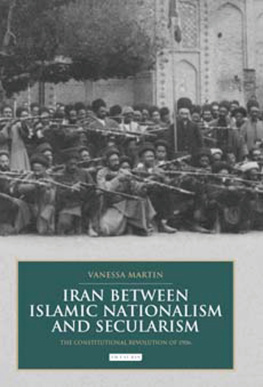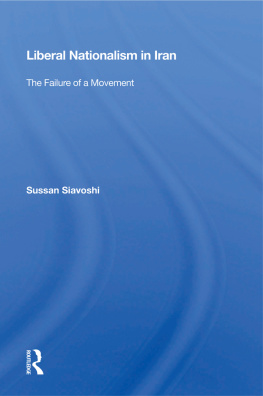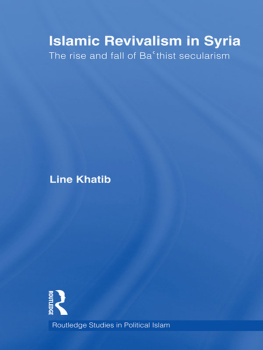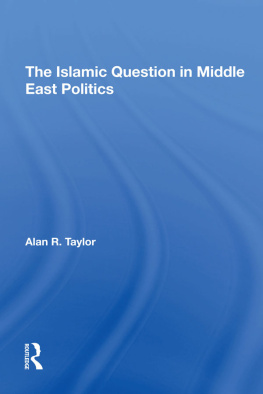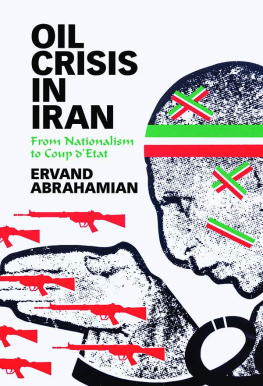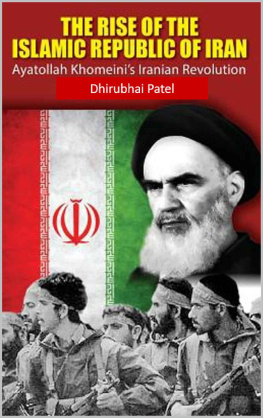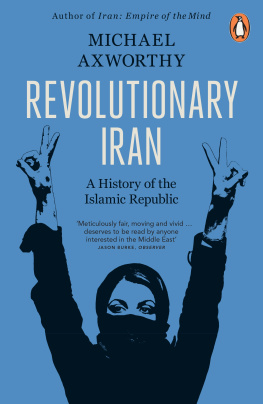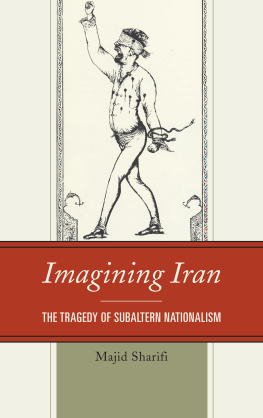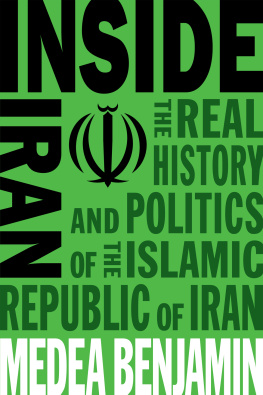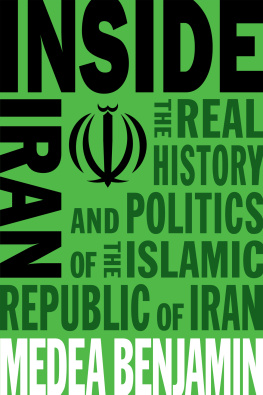Vanessa Martin is Professor of Middle Eastern History at Royal Holloway, University of London. Her previous publications include Islam and Modernism: The Iranian Revolution of 1906 (1989), Creating an Islamic State: Khomeini and the Making of a New Iran (2000, 2003), The Qajar Pact: Bargaining, Protest and the State in Nineteenth-Century Persia (2005) and (co-edited with Houchang Chehabi) Irans Constitutional Revolution: Popular Politics, Cultural Transformations and Transnational Connections (2010), all with I.B.Tauris.
I.B.Tauris & BIPS Persian Studies Series
Series ISBN 978 1 84885 203 7
Series Editor
Vanessa Martin
Editorial Board
C. Edmund Bosworth, Robert Gleave, Vanessa Martin
The I.B.Tauris / BIPS Persian Studies Series publishes scholarly works in the social sciences and humanities on Iran. Such works include: original research monographs, including biographies and suitably revised theses, specially planned books deriving from conferences, specially commissioned multi-authored research books, academic readers and translations.
1 The Practice of Politics in Safavid Iran: Power, Religion, Rhetoric
Colin P. Mitchell
978 1 84511 890 7
2 The Ilkhanid Book of Ascension: A Persian-Sunni Prayer Manual
Christiane Gruber
978 1 84511 499 2
3 Hafiz and his Contemporaries: A Study of Fourteenth-Century Persian Love Poetry
Dominic Brookshaw
978 1 84885 144 3
4 The Ornament of Histories: A History of the Eastern Islamic Lands AD 6501041
The Original Text of Ab Sad Abd al-Hayy Gardz
Tranlsated and Edited by C. Edmund Bosworth
978 1 84885 353 9
5 The Safavid Dynastic Shrine: Architecture, Religion and Power in
Early Modern Iran
Kishwar Rizvi
978 1 84885 354 6
6 Iran Between Islamic Nationalism and Secularism:
The Constitutional Revolution of 1906
Vanessa Martin
978 1 78076 663 8

To Javad, Lili and Neda
CONTENTS
Part I
The Coming of the Revolution 18961906
Part II
The Period of the First Majlis 19061908
.
This book was from the beginning intended to be based as far as possible on primary material reflecting a variety of little-studied contemporary views of the Revolution of 1906. For this reason my research visits to Iran have been especially significant. Therefore, first and foremost, I am greatly indebted in my research for this book to the many scholars of my subject, and staff in the archives of Iran, for their invaluable interest and assistance during my visits there. Considerable help, comments and advice were given to me in Tehran by Dr Hossein Abadian, who offered stimulating debate, and also obtained for me copies of the newspaper Nida-yi Islam. Mr Reza Mokhtari gave most generously of his time in exploring the archives, and obtaining material. I am grateful to Mr Reza Salami for his most scholarly assistance in the reading of hand-written texts. Dr Mansoureh Ettehadieh Nezam-Mafi gave me the opportunity of attending gatherings on my subject and kindly donated to me some of the latest publications in Persian. I much appreciate the hospitality of Dr Mohammad Ali Kazembeyki, our debates and exchange of ideas. With regard to archives and libraries, I am extremely grateful to Dr Sadeq Sajjadi at the Centre of the Great Islamic Encyclopaedia, who enabled me to have access to the newspaper collection and to study regularly in the library. He was particularly kind in providing me with copies of the newspaper Habl al-Matin. All the staff of the National Archives of Iran and the National Library were unfailingly helpful both in exploring the catalogue and in providing me with the material requested. I am most grateful to Mr Musa Haqqani and Mr Reza Farasti of the Moasseseh-ye Motalaat-e Tarikh-e Moaser-e Iran for their assistance, as well as the staff there, who made such a thorough search of their collection for the items requested. I was delighted to have access to the magnificent collection of the Majlis Library in Tehran, the modernisation of which owes much to the admirable initiative of Dr Rasool Jafarian, the Director. Mr Kuroosh Moradi, who is the Head of the Newspaper Section, was outstandingly helpful in allowing me to study the impressive newspaper collection and in providing the material needed. I would like also to express appreciation of the efforts of Mr Ali Tatari of the Majlis Library for his assistance, and his endeavours in building up the new Constitutional Revolution section. I was fortunate to be able to visit the Archive of the Ministry of Foreign Affairs, which has made impressive advances in archival management in recent decades. The Head of the Document Office, Mr Ali Asghar Rastineh, and staff were especially helpful in enabling me to study their highly significant collection of documents. The Bonyad-i Daerat al-Maaref-e Islami gave me the opportunity to use their valuable collection of books, and Mrs Afsaneh Monfared was particularly warm in her assistance.
In Isfahan, Dr Morteza Nouraei was extremely helpful in introducing me to all the local archives. The staff of the Museum of the History of Education of Isfahan were most hospitable in showing me their illuminating collection and providing me with material. I would especially like to thank Mr Hasan Nejad, the Director, and Mr Parsapour and Mr Rajai. Mr Ahmed Reza Torfehnezhad permitted me to explore his private archive, which has many unusual documents. I also found the staff of the National Archives of Isfahan most welcoming and interested in my research. Dr Siroos Baradaran-Shokoohy, in Tabriz, shared his considerable knowledge of the history of Tabriz and its primary material regarding my research, and arranged for me to visit all the relevant archives and libraries. I am deeply grateful to him. At the National Archives of North West Iran, Tabriz the Director, Sayyid Mohammad Masud Naqib, Mr Hasan Asvadi and the staff were most hospitable in helping me explore the collection. The Director of Iran Heritage, Mr Turab Mohammadi, very kindly introduced me to the museums there. The Museum of the Constitutional Revolution (Museh Mashruteh) has a fascinating collection regarding the events of the period. Mr Yunis Shirzad and the staff there took much trouble in enabling me to photograph some of the documents. I am absolutely grateful to the Central Library of Tabriz, to the Director, Mr Madani, for welcoming me there, and to Mr Mahmud Mahmudzadeh, the Head of the Newspaper Section, for the considerable time and trouble he took in enabling me to have copies from the fine collection of the contemporary newspapers. Mr Jadid al-Islams outstanding collection of photographs has provided me with illustrations for the book, for which I am grateful to him. I would also like to express gratitude to the British Institute of Persian Studies for their contribution to the funding for the research visits to Iran and to my research. Discussion with Dr Denis Hermann of the Centre national de la recherche scientifique (CNRS) in Paris, on the ideas of Akhund Khurasani has stimulated greater understanding of his view. I much appreciate him providing me with a copy of his forthcoming article on Khurasanis role in the mashruta. I would also like to thank Dr Mateo Farsaneh for sending me his paper on Khurasani delivered at the University of California in March 2012. The effort of Dr Siavush Ranjbar-Daemi in obtaining copies of newspapers is greatly appreciated. I also much appreciate the efforts of Mr Onur Sar in providing me with copies and translations of diplomatic dispatches from the Ottoman collection in the State Archives in Istanbul. Publication has been much assisted by a grant from the late Miss Isobel Thornleys Bequest to the University of London and from the Lincoln Record Society.


